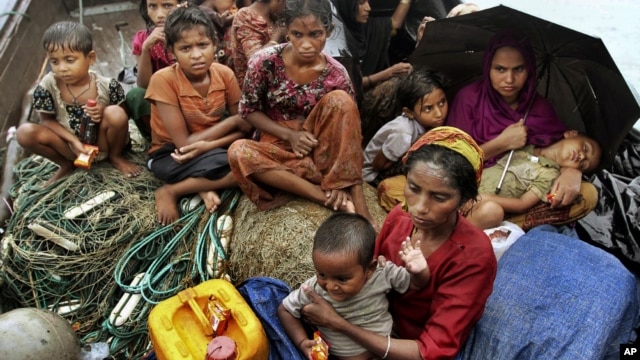
In this June 13, 2012 file photo, Rohingya Muslims who fled Burma to Bangladesh to escape religious violence, sit in a boat after being intercepted crossing the Naf River by Bangladeshi border authorities in Taknaf, Bangladesh.
BANGKOK — A new report on the sectarian violence in Burma’s Western Rakhin State is accusing Burma’s military of participating in attacks on ethnic Rohingya and doing little to stop violence that killed at least 78 people and displaced tens of thousands. The Human Rights Watch report comes as the U.N. human rights envoy travels to the affected region.
The report released Wednesday by Human Rights Watch says hundreds of Muslim Rohingya men and boys have been detained in mass arrests since June. It says their whereabouts are, as yet, unknown.
The bloodshed in Rakhin state between Muslim Rohingya and largely Buddhist communities erupted in May after a Arakan Buddhist woman was sexually assaulted and murdered.
This triggered reprisal killings in June, when 10 Muslim men were attacked and murdered by Arakan villagers.
Security forces criticized
Human Rights Watch says government security forces stood by and failed to intervene in the June 3 attack. Later, as violence escalated and thousands of Rohingya rioted, it says police and paramilitary trooped fired on Rohingya communities.
Rights workers interviewed both Arakan and Ronhingya communities.
A Rohingya man recounts how his house was raided by the military. He explains how the military searched all the homes. He says when no adults were found, soldiers tied up and beat the children until they fainted.
Both ethnic communities attacked villages and neighborhoods, destroying and burning homes, shops and houses of worship.
Phil Robertson, Human Rights Watch’s deputy Asia Director, said the Burmese government and army could have done more to prevent the bloodshed.
"There were failures of both ‘omission’ and ‘commission’ by the government of Burma," he said. "Omission in the early stages of the violence when the government did little to stop the sectarian violence which was then compounded by acts of commission which we documented as security forces took control of the situation and focused their attention on the Rohingya.”
Muslim exodus
In the capital of Sittwe most Muslims have fled or have been forcibly relocated. Shops held by Muslims have been commandeered by the state.
Burma largely denies citizenship to the estimated 800,000 to one million Rohingya, adding to communal tensions.
Robertson says Western governments have also failed to address the issue. He also criticized neighboring Bangladesh for a policy of pushing back to sea thousands of Rohingya who fled the violence. But Robertson remains convinced that the community can still achieve reconciliation.
"Obviously, there’s still time to stop this," he said. "There needs to be an effort to promote effective reconciliation between these two groups. But that reconciliation really requires also a full accounting of what has taken place. Who on both sides - the Rakine side and the Rohingya side were responsible for the violence? Who in the security forces ordered security forces to shoot civilians, to conduct these various different human rights violations and these mass sweeps?"
On Monday, Burma’s Foreign Ministry “strongly” rejected the charges of abuses and excessive force, saying the government exercised “maximum restraint” in order to restore law and order.
The government says it has set up a special committee to investigate the violence, as well as relief camps for both communities, with United Nations assistance. The International Committee for the Red Cross said it was also providing “basic aid and assistance” in Rakhin state.
The report’s release coincides with U.N. human rights envoy Tomas Ojea Quintana's official visit to Burma. Quintana traveled to Rakhin state to evaluate the damage to the region. He is expected to report his findings in the coming days. |
|
